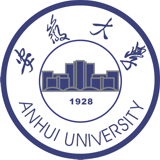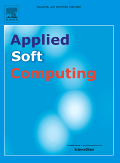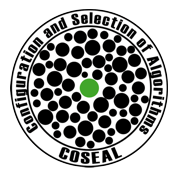
- Written by: Thomas Weise
On Wednesday, October 25, 2017 from 09:30 to 10:20, I presented my research talk "Automating Scientific Research in Optimization" in Anhui University (AHU) [安徽大学], Conference Hall on the First Floor below of the Xingzhi Building [安徽大学磬苑校区行知楼负一楼报告厅] at the Symposium on Evolutionary Computation [进化计算领域专家系列学术报告会] under the organization of Professors Xingyi Zhang (Anhui University) and Bin Li (USTC) for the IEEE CIS Hefei Chapter. The talk followed the presentation "Approximation-Guided Many-Objective Optimisation and the Travelling Thief Problem" by our guest researcher Dr. Markus Wagner, Senior Lecturer from the Optimisation and Logistics Group of the School of Computer Science of The University of Adelaide, Australia and, in turn, was followed by the talk "Species-based PSO for Continuous Dynamic Constrained Optimization" by Associate Prof. Dr. Wenjian Luo (USTC). All talks are open for any interested audience. [poster, slides]

- Written by: Thomas Weise
Senior Lecturer Dr. Markus Wagner from the Optimisation and Logistics Group of the School of Computer Science of The University of Adelaide, SA, Australia presented the research talk "Approximation-Guided Many-Objective Optimisation and the Travelling Thief Problem" on Wednesday, October 25, 2017 from 08:40 to 09:30 in Anhui University (AHU) [安徽大学], Conference Hall on the First Floor below of the Xingzhi Building [安徽大学磬苑校区行知楼负一楼报告厅] at the Symposium on Evolutionary Computation [进化计算领域专家系列学术报告会] under the organization of Professors Xingyi Zhang (Anhui University) and Bin Li (USTC) for the IEEE CIS Hefei Chapter. The talk is followed by the talks "Automating Scientific Research in Optimization" by Prof. Weise and "Species-based PSO for Continuous Dynamic Constrained Optimization" by Associate Prof. Dr. Wenjian Luo (USTC). The audiences of all presented talks were quite big and interesting discussions ensued. [poster, slides]

- Written by: Thomas Weise
Our institute welcomes Dr. Markus Wagner, Senior Lecturer from the Optimisation and Logistics Group of the School of Computer Science of The University of Adelaide, SA, Australia, for a research visit from October 24 to November 2. His stay is supported by the Australia-China Young Scientists Exchange Program 2017 (YSEP) [中澳青年科学家交流计划] organized by the China Science and Technology Exchange Center (CSTEC) [中国科学技术交流中心] and the Australian Academy of Technology and Engineering (ATSE).
The members of the Optimisation and Logistics Group in Adelaide research optimization methods that are frequently used to solve hard and complex optimization problems. These include linear programming, branch and bound, genetic algorithms, evolution strategies, genetic programming, ant colony optimization, local search, and others. The areas of interest of Dr. Wagner are heuristic optimization and applications thereof. His work draws on computational complexity analysis and on performance landscape analysis.
Dr. Wagner and the members of our institute will spend most of his visiting time on joint research and on developing future joint projects and collaborations. Additionally, he will visit our colleagues Bin Li at USTC and Xingyi Zhang at Anhui University and give two presentations open for any interested listeners:
- Approximation-Guided Many-Objective Optimisation and the Travelling Thief Problem in Anhui University (AHU) [安徽大学] and co-invited by the IEEE CIS Hefei Chapter [slides]
- Two Real-World Optimisation Problems Related to Energy at our group [slides (android energy consumption), slides (wave energy)]
Short Biography
Dr. Markus Wagner is a Senior Lecturer at the School of Computer Science, University of Adelaide, Australia. He has done his PhD studies at the Max Planck Institute for Informatics in Saarbrücken, Germany and at the University of Adelaide, Australia. His research topics range from mathematical runtime analysis of heuristic optimization algorithms and theory-guided algorithm design to applications of heuristic methods to renewable energy production, professional team cycling and software engineering. So far, he has been a program committee member 30 times, and he has written over 70 articles with over 70 different co-authors. He has chaired several education-related committees within the IEEE CIS, is Co-Chair of ACALCI 2017 and General Chair of ACALCI 2018. Dr. Wagner is also a co-chair of our International Workshop on Benchmarking of Computational Intelligence Algorithms (BOCIA) and a co-guest editor of the Special Issue on Benchmarking of Computational Intelligence Algorithms in the Computational Intelligence Journal with Profs. Thomas Weise, Bin Li (USTC), Xingyi Zhang (Anhui University), and Jörg Lässig (University of Applied Sciences Zittau/Görlitz).
Read more: Welcome to Guest Researcher Dr. Markus Wagner from the University of Adelaide [2017/10]
- Written by: Thomas Weise
Special Issue on Benchmarking of Computational Intelligence Algorithms
Applied Soft Computing by Elsevier B.V.
http://iao.hfuu.edu.cn/bocia-asoc-si
 Computational Intelligence (CI) is a huge and expanding field which is rapidly gaining importance, attracting more and more interests from both academia and industry. It includes a wide and ever-growing variety of optimization and machine learning algorithms, which, in turn, are applied to an even wider and faster growing range of different problem domains. For all of these domains and application scenarios, we want to pick the best algorithms. Actually, we want to do more, we want to improve upon the best algorithm. This requires a deep understanding of the problem at hand, the performance of the algorithms we have for that problem, the features that make instances of the problem hard for these algorithms, and the parameter settings for which the algorithms perform the best. Such knowledge can only be obtained empirically, by collecting data from experiments, by analyzing this data statistically, and by mining new information from it. Benchmarking is the engine driving research in the fields of optimization and machine learning for decades, while its potential has not been fully explored. Benchmarking the algorithms of Computational Intelligence is an application of Computational Intelligence itself! This special issue of the EI/SCIE-indexed Applied Soft Computing journal published by Elsevier B.V. solicited novel contributions from this domain according to the topics of interest listed below.
Computational Intelligence (CI) is a huge and expanding field which is rapidly gaining importance, attracting more and more interests from both academia and industry. It includes a wide and ever-growing variety of optimization and machine learning algorithms, which, in turn, are applied to an even wider and faster growing range of different problem domains. For all of these domains and application scenarios, we want to pick the best algorithms. Actually, we want to do more, we want to improve upon the best algorithm. This requires a deep understanding of the problem at hand, the performance of the algorithms we have for that problem, the features that make instances of the problem hard for these algorithms, and the parameter settings for which the algorithms perform the best. Such knowledge can only be obtained empirically, by collecting data from experiments, by analyzing this data statistically, and by mining new information from it. Benchmarking is the engine driving research in the fields of optimization and machine learning for decades, while its potential has not been fully explored. Benchmarking the algorithms of Computational Intelligence is an application of Computational Intelligence itself! This special issue of the EI/SCIE-indexed Applied Soft Computing journal published by Elsevier B.V. solicited novel contributions from this domain according to the topics of interest listed below.
Here you can download the Call for Papers (CfP) in PDF format and here as plain text file. The journal's website where the papers appear is here. The special issue has now been completed and 14 articles were accepted and published.

- Written by: Thomas Weise
Today, Prof. Thomas Weise joined the COnfiguration and SElection of ALgorithms group (COSEAL). COSEAL is an international group of researchers with focus on algorithm selection and algorithm configuration. These two topics are very closely related to our research direction Rigorous Performance Analysis of Algorithms, in particular to the Optimization Benchmarking project.
In order to find the best way to solve an optimization problem, we need to use the best algorithm and the best setup of this algorithm. Algorithm setups have both static and dynamic components, both of which are vital for the algorithm performance. Static parameters do not change during the algorithm run, common examples are (static) population sizes of Evolutionary Algorithms or the tabu tenure of Tabu Search. Dynamic parameters can change all the time, either according to a fixed schedule (like the temperature in Simulated Annealing) or in a self-adaptive way (like the mutation step size in a (1+1) Evolution Strategy with the 1/5th rule). We may also choose the algorithm to apply based on some problem features or dynamically assign runtime to different algorithms based on their progress, i.e., construct some form of meta-algorithm. COSEAL aims to find good algorithm configurations, both dynamic and static, as well as algorithm selection methods.
Where does benchmarking come into play? First, better techniques for benchmarking may lead to better policies for dynamic algorithm configuration. Second, in order to know whether a static or dynamic algorithm parameters and algorithm selection methods work well over different problems, we need benchmarking. Third, benchmarking may tell us the strengths and weaknesses of a setup or algorithm.
Due to this close relationship, several other members of COSEAL also join in the programme committee and even the chairing team of our International Workshop on Benchmarking of Computational Intelligence Algorithms (BOCIA).
